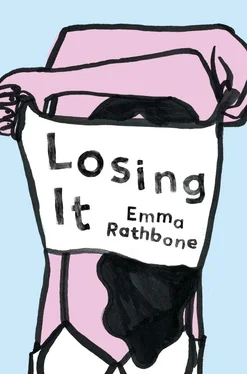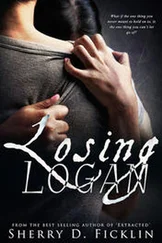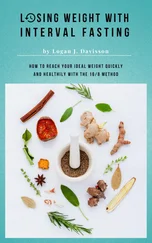1 ...6 7 8 10 11 12 ...48 “I think so,” I said quickly.
“Well, they do a feature.”
“That’s awesome,” I said. “That’s really cool. So are you—”
“Well, I’m going to eat something,” she said. “There are leftovers in the fridge.” And then she turned around and walked away.
—
And that was how I ended up driving into town the next day with Aunt Viv in her Honda Civic. It was hot and bright and everything was bursting with full summer lushness, the sky a chesty blue.
“Alice is in the last stages of lymphoma,” she said.
“Oh.” I was picking the sticky protective shield off the screen of my cell phone. I put it down and looked at her. “That’s horrible. I’m sorry.”
“Well, she’s got a good support system.”
“How long have you known her?”
“Many years,” said Viv. “We worked together.”
She was wearing diamond-shaped emerald earrings and her hair was swept back into an elegant French braid.
She glanced at me. “Have you spoken to your parents?”
“A little,” I said. “They seem to be doing fine. They’re, like, meditating every day and doing psychic weaving with a shaman or something.”
This little dash of sarcasm did not seem to go over with Aunt Viv. It was quiet for a while. We passed someone hanging up a row of small white dresses for a yard sale.
“It must be very interesting,” she said. “It must be a very interesting culture. There in South America.”
“Yes. Yes! It must be,” I said, nodding. “So, would you— Is that somewhere you’d want to go?”
“Perhaps,” she said. “I think I’d rather go to Europe. Verona. I haven’t really been out of the country much.”
“Why there?”
“The music,” she said. “The opera at the outdoor amphitheater, with everyone holding candles at night.” She sang a tune, a few notes of something, as if she were in a daydream, and then looked at me expectantly. My eyes darted around the car.
We drove along a street with many old Southern mansions set way back from the road. After a while we turned onto a narrower street, with smaller houses, and pulled up in front of a shady, flower-petal-covered walkway.
We got out of the car at the same time as a woman with long, earth-mother gray hair who was carrying some kind of pickled thing leaking out of a plastic bag and so had to hurry in ahead of us.
We were greeted at the door by a large woman named Karen wearing a purple dress with many layers. Her face was filled with happiness, her eyes dancing, her cheeks flushed. “Vivi!” she said, and then gave my hand a vigorous shake.
She led us down a hallway into a living room with zebra pillows and decorative spears on the walls and other foreign-looking artifacts. Viv introduced me around, and then the crowd parted to reveal Alice, swaddled in purple scarves, sitting stoically in a wicker chair like a village elder or seer.
She had a weak chin and warm brown eyes, and a trembling shine about her — like a bulb of water on a leaf right before it breaks. She smiled up at me and said, “I’m so glad to meet one of Viv’s relatives.” Viv knelt down beside her and took one of her hands and held it like it was the most fragile thing in the world while her face broke into a smile of bald admiration and sadness.
I said hello and then backed away to give Aunt Viv and Alice some room, and then weaved back through the house to find something to drink. It felt like I was intruding to stay talking to them longer. I was wearing tights even though it was a hot day, and they were itchy and sagging down and I had an eyelash in my eye.
“This was my aunt Cassie,” said a woman named Diane, who had intercepted me and then led me into a room — it was her house — where she showed me how she’d lacquered old pictures of her relatives onto the top of her desk. Cassie stared sternly out from a rocking chair.
“Great,” I said.
“And this is my great-grandfather Francis. They called him Franny.”
“Oh, okay.”
Diane obviously had a lot of time on her hands. I sensed she had more money than the other women. From what I’d gathered, they were all part of a core friend group that met while working at a hospice before it closed.
“It’s so I can have them all around me,” she said, sweeping her hand around the room. “All my ancestors, whispering from the eaves.”
“Yeah,” I said, smiling, trying to seem appropriately receptive to that concept. “I can see how that would be nice.”
After about twenty minutes, I managed to extract myself by saying I was thirsty and wanted to get some water. Then I slalomed between a few other people who looked like they wanted to talk and ended up positioning myself by a set of glass shelves. I pulled out various photography books and pretended to look at them, but really I was studying the women.
I watched Karen — the one who greeted us — walk around offering people cups of juice, stopping now and then to chat. Her arms were mottled red and she had a bustling and helpful way about her. I wondered if that’s how she’d be in bed — cheerfully helping things along in a brusque and no-nonsense manner, like a fishwife who’d seen it all. She would probably just want to get to the next thing and it wasn’t that complicated. I wondered if she was married and thought about how the right man could have a lot of happiness with a woman like that. She wasn’t what you would call attractive in a conventional sense, but now and then she shrieked with laughter and seemed to find mischievous humor in everything and you could probably have a kind of ribald joy with her of the kind that wasn’t seen in movies or porn.
I watched Diane massage the back of her neck and tilt her head serenely to the side while talking to someone. She was sort of beautiful in a strategically tousled way. She had a self-consciously throaty manner, like she wanted the world to know how deeply she felt things. I imagined she was really theatrical in bed and had deep, oaky orgasms and saw herself from the outside the whole time and threw a bunch of colored scarves into the air when she came.
Then there were people you couldn’t imagine having sex. I studied a woman sitting on the couch whom I hadn’t been introduced to. She had the prim face of a prairie schoolteacher and was irritably rummaging through a lime-green bag. She pulled out a bunch of receipts and pawed through them in her hand. I noticed middle-aged women like that sometimes. They’ll be wearing a hand-crafted vest over a turtleneck or something and pretty much expressing to the world that sex or the idea of sex was generally not on the table. But I couldn’t tell if, this lady for instance, if she had done this to herself or if everyone else had done it to her.
My thoughts were interrupted by Karen. We got into a conversation about how her father had been a door-to-door salesman in Nevada.
“‘It’s a forgotten art,’ is what he always used to say,” she said.
“Gosh,” I said, thinking about walking around hot, flat, grid-shaped neighborhoods wearing a business suit.
“How long do you think you’ll be staying with your aunt?” she said, turning back to me and reaching for an olive. We were now standing in the kitchen, where some snacks had been laid out.
“A few months, until the end of summer.”
A wistful look came over her face. She looked into the distance. “You’re lucky.”
“What do you mean?”
“To get to spend so much time with Vivienne. She’s such an adventurous soul.”
“Yeah,” I said, somewhat confused.
“We were all so impressed when we heard about Bora Bora.”
“Bora Bora?”
She nodded, popped a cube of cheese into her mouth. “You know, not that many people would do what she did — just go and live there by themselves for a year. It takes a lot of guts. She’s hilarious about it, too. The coconut pantomime? You should ask her about it. I wish I could have gone.”
Читать дальше
Конец ознакомительного отрывка
Купить книгу












